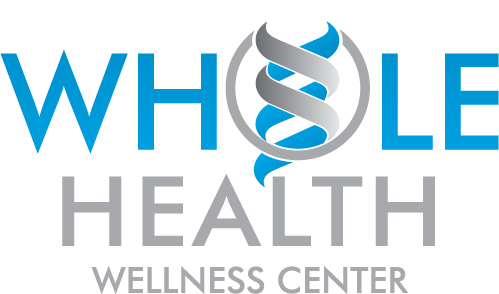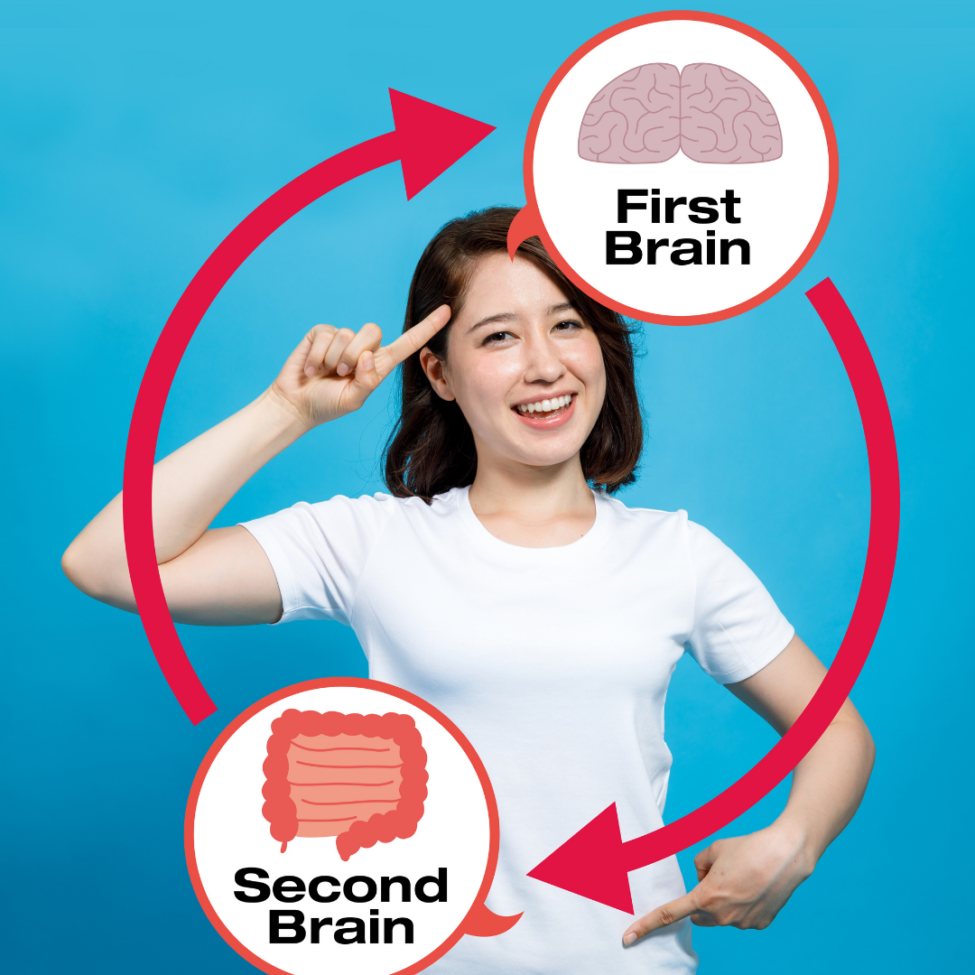By Dr. Karen Bender, ND, RN
Have you ever had a gut feeling about something? What about having butterflies in your stomach when nervous or excited? These common experiences are examples of how the gut and the nervous system are connected. In the research, this connection is referred to as the gut-brain axis. In this article, we will explore the ways these systems are connected and how you can use nutrition and lifestyle to improve their communication and functioning. You may be surprised by how the brain and gut are affecting each other.
The Physical Connection: The Vagus Nerve
This important nerve is named the vagus nerve because it wanders throughout your body, connecting the brain to many parts of the body. It’s the longest nerve in the body, originating at the brain stem and stretching to the heart, lungs, liver, pharynx, stomach, and small and large intestines.
The vagus nerve both sends and receives information from the brain. The brain sends messages along the vagus nerve to the digestive tract to stimulate the secretion of gastric acid and digestive enzymes. The brain receives messages from the vagus nerves that communicate hunger, fullness, and direct energy metabolism.
Low tone or function of the vagus nerve can contribute to the development of depression, PTSD, and inflammatory bowel diseases such as Ulcerative Colitis and Crohn’s (1)
Fortunately, there are techniques to help improve vagal tone. Examples include deep breathing exercises, meditation, signing, and biofeedback. To learn more, read this article about the Vagus nerve.
How Gut Microbes Affects the Brain
Neurotransmitters
Neurotransmitters are the chemical messengers of the body. They are another way the gut and brain are connected.
Perhaps you have heard of serotonin as the neurotransmitter of happiness. Interestingly, the majority of serotonin is made in the gut and is influenced by gut bacteria (2) Since this serotonin cannot cross the blood-brain barrier (BBB), it is unlikely that it directly affects the brain. However, it can participate in brain-gut communication by modulating signals transmitted to the brain from the gut via the Vagus Nerve. It also affects inflammatory responses in the gut, gut motility, and platelet function(3).
Your gut microbes also produce a neurotransmitter called gamma-aminobutyric acid (GABA), which helps control feelings of fear and anxiety (4). In particular, studies have shown that the probiotic, Lactobacillus rhamnosus, can increase the production of GABA and reduce anxiety and depression-like behavior (5).
Inflammation
Gut microbes also play an important role in your immune system and inflammation (6).
One way inflammation is initiated is by a toxin called Lipopolysaccharide (LPS) that is found in the cell wall of gram-negative bacteria (i.e. E. Coli and other Enterobacteria and those in the Bacteroides genus). Unresolved inflammation caused by LPS can damage the lining of the digestive system and make it permeable or “leaky”. When the natural barrier of the intestines is compromised, LPS can get into the bloodstream and cause inflammation to spread to the brain.
This is particularly true when levels of Short Chain Fatty Acids (SCFA) are low. These important fatty acids are made by certain good bacteria in the gut when they digest fibers in our diet that we cannot break down. They reduce inflammation in the gut and prevent it from becoming “leaky”. SCFAs also protect and maintain the barrier around the brain known as the blood-brain barrier (BBB) (7).
Inflammation caused by high LPS in the blood have been associated with a number of brain disorders including severe depression, dementia, and schizophrenia (8)
Nutrition: the importance of prebiotics and probiotics
Prebiotics are undigested fibers that are broken down by bacteria in the gut and produce Short Chain Fatty Acids (SCFA). As you will remember, SCFA are vital anti-inflammatory nutrients that protect the gut and brain. Prebiotics can be taken as supplements or found in food. Here is a list of foods high in prebiotic fiber. Help protect your gut and brain by eating these foods on a daily basis.
- Jerusalem artichokes/sunchokes: an edible tuber similar to a potato that has a delicious nutty flavor when roasted.
- garlic
- onions and leeks
- asparagus
- chicory root: coffee-like flavor, often found in coffee alternative herbal teas
- dandelion greens
- oats
- barely
- apples
- cocoa
Get probiotics from your diet by eating fermented foods with active cultures. Make sure to always buy fermented foods in the refrigerated section and read on the label that live cultures are present. Here is a list of fermented foods to try and eat daily. If you struggle to eat these foods on a regular basis, a probiotic supplement may be recommended but this is should be discussed with your medical provider first.
- Kefir
- Sauerkraut
- Tempeh
- Natto
- Kombucha
- Miso
- Kimchi
Personalized treatment
Are you experiencing anxiety or depression and wonder if your gut health might be affecting your brain? Or maybe you have digestive health concerns like gas and bloating, heartburn, diarrhea, or constipation and after reading this article you are concerned about how this might be affecting your brain.
The difference with Naturopathic care is that the connection between all body systems is taken into account when considering treatment. As a Naturopathic Physician, I consider all the factors that could be affecting how you feel and use personalized treatments to address them.
The first step in formulating a personalized treatment plan is diagnostic testing. When evaluating gastrointestinal health I use a comprehensive stool test that you will not typically find in a conventional medical evaluation. This test includes the following components:
- Microbiome PCR: This method of determining the type and amount of bacteria in the colon is more accurate than culture. Knowing this information helps determine if a treatment is needed to rebalance the microbiome.
- Markers of inflammation: Helps to determine if inflammatory bowel disease may be present or if inflammation in the gut may be contributing to systemic inflammation that could also be affecting the brain.
- Pancreatic enzymes and products of fat and protein breakdown: Helps determine how well the digestive system is breaking down and absorbing macronutrients such as fats, protein, and carbs and if supplemental enzymes would be beneficial.
- Short-Chain Fatty Acids: Molecules made by good bacteria in the gut. They provide food to the cells of the colon and prevent it from becoming “leaky”. Low amounts of SCFAs are also associated with a compromised blood-brain barrier function.
- Beta- Glucosidase: An enzyme made by certain bacteria that prevent the elimination of excess estrogens from the body via the stool. When levels are elevated estrogen imbalance is likely (9).
If significant gas and bloating are present I may first recommend a SIBO (small intestinal bacterial overgrowth) breath test to rule out an overgrowth of bacteria in the small intestines.
Takeaways
- The brain and gut are physically connected by the Vagus Nerve. When the tone of this nerve is impaired poor digestive functioning can occur. Deep diaphragmatic breathing exercises are an effective way to improve vagal tone.
- Bacteria in the gut produce SCFAs from the prebiotic fiber in your diet. SCFAs regulate inflammation and maintain the integrity of the gut lining and blood-brain barrier.
- Certain bacteria produce the toxin LPS. LPS causes inflammation in the gut and can cross into the bloodstream and affect the brain.
- If you have digestive issues that are not addressed you could be at increased risk of developing anxiety, depression, and neurodegenerative diseases.
- Specialized testing is the best way to determine and treat imbalances in the gut.
References
- https://www.frontiersin.org/articles/10.3389/fpsyt.2018.00044/full
- https://www.ncbi.nlm.nih.gov/pmc/articles/PMC4393509/
- https://www.sciencedirect.com/topics/neuroscience/enterochromaffin-cell
- https://www.ncbi.nlm.nih.gov/pmc/articles/PMC5127831/
- https://pubmed.ncbi.nlm.nih.gov/26577887/
- https://www.ncbi.nlm.nih.gov/pmc/articles/PMC5541232/
- https://journals.sagepub.com/doi/10.1177/0004867418796955#
- https://www.ncbi.nlm.nih.gov/pmc/articles/PMC4604320/
- https://www.mdpi.com/2073-4409/8/12/1642/htm#:~:text=Gut%20bacteria%20possessing%20%CE%B2%2Dglucuronidase,estrogen%20mimics%20from%20dietary%20sources.

